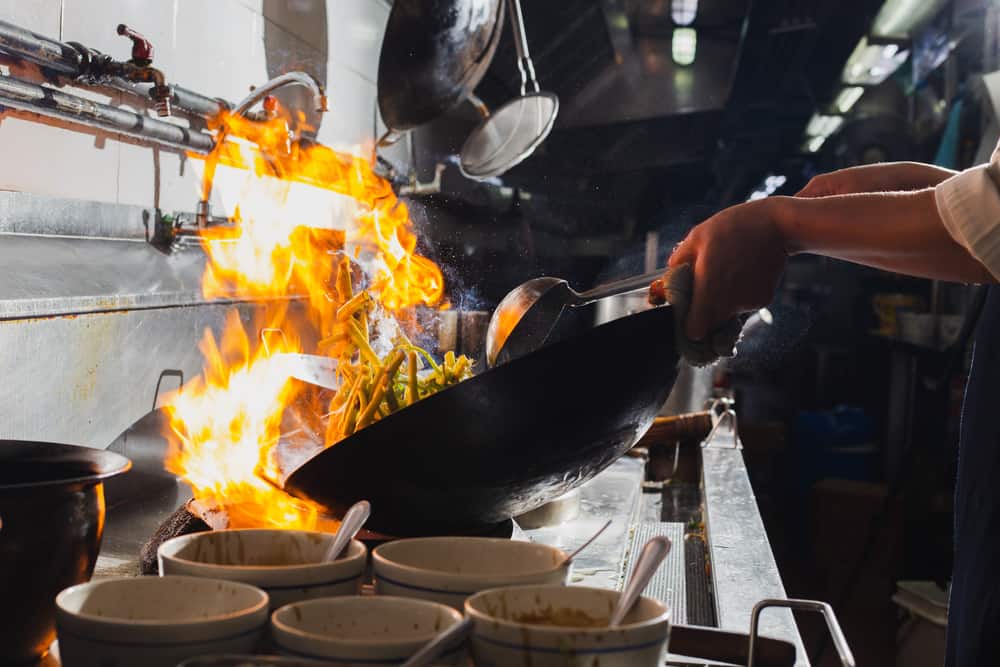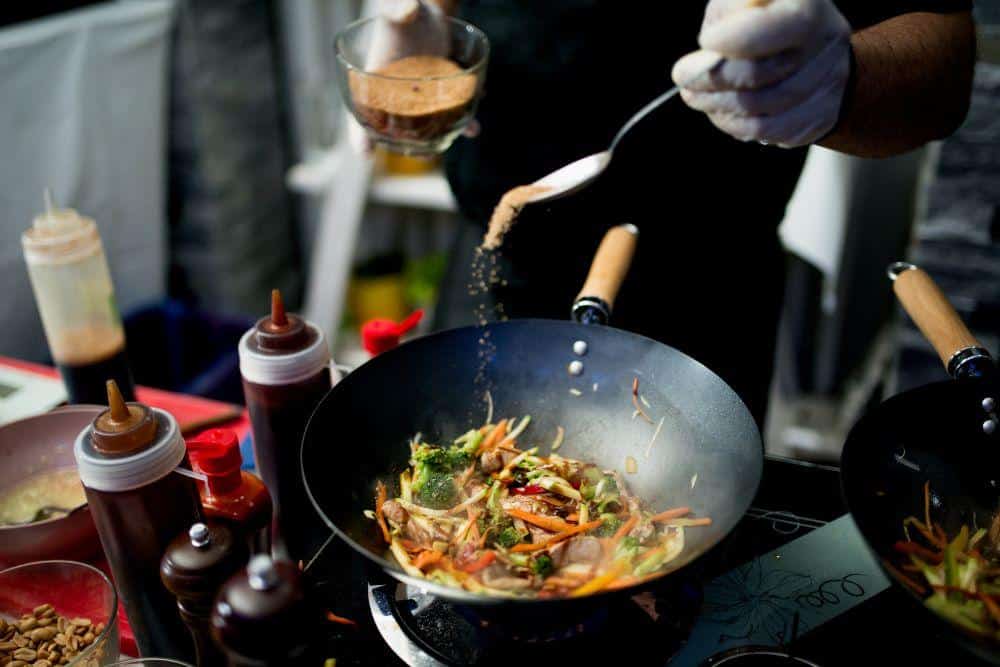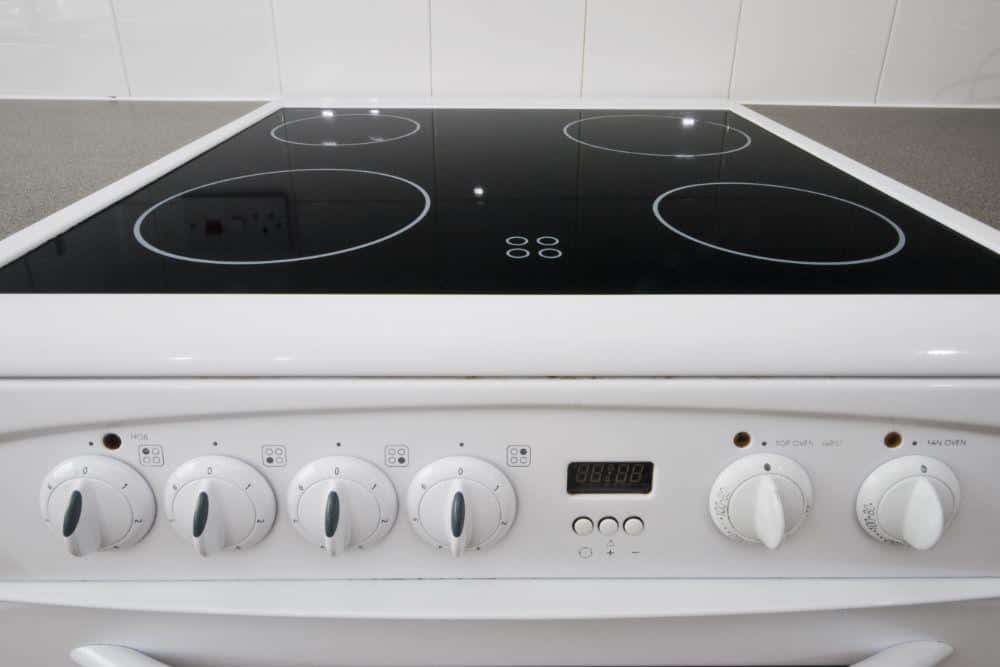If you’re a fan of Asian cuisine, you’ve probably added a wok to your cooking itinerary. The wok is the most versatile kitchen utensil known for its even heat distribution and heat retention capabilities.
This means your food is never undercooked, and you can steam, stir fry, braise, and fry food at a high temperature. Even with so many advantages, many homeowners put off buying the wok, fearing it won’t work on an electric stove. It couldn’t be further from the truth.
Woks work on electric stoves like other cooking pots. It’s only a matter of picking the right wok type to fit your electric stove. The next part of the article explains what a wok is and expounds on the question, can you use a wok on an electric stove further.
A wok is a flat, round-bottomed, high-walled pan resembling a frying pan. It’s native to the Chinese and some Asian countries who use it for cooking various foods. A wok has two handles (a long and a short handle) on either side, making it easy to toss veggies and other foods when cooking.

Using a Wok on a Gas Stove
Unlike a regular frying pan, a wok distributes heat more evenly. Its concave shape, slanted slopes, and construction material enhances heat distribution and eliminates hot/cold spots as in regular cooking pots. Woks are made from different construction materials and come in varying shapes.
This is the most common wok type. A round bottomed wok is great for stirring and mixing, and their depth prevents spilling. As such, cooking is cleaner with a round bottom wok than with a flat-bottomed wok. The only downside with round bottom woks is that not all of them will work well on an electric stovetop.
If using a wok, you need a wok ring to enhance stability when cooking, as explained later in the article. That’s why the flat bottom wok is more popular than the round bottom wok (they can work on all stove types).
The flat-bottomed wok is stable, so there’s no need to support it when cooking. As a result, the heat is evenly distributed on the sides and the bottom of the wok allowing food to cook correctly. The only downside of flat-bottom woks is that they’re not the best for mixing food. The shallow edges spill food easily and can’t cook large amounts of food because some ingredients may end up undercooked.
Carbon steel is the most popular material for making woks. Its lightweight construction, durability, and heat distribution make the carbon steel wok a favorite among chefs. Although a carbon steel wok doesn’t need seasoning before use, a well-seasoned one reduces the chances of food sticking to the pan.

Spices Being Added to A Carbon Steel Wok
To season the pan, wash it, rub the inner surface with cooking oil and place it on a stove at the highest heat setting. Once the wok starts smoking, remove it from the stove. The wok pan becomes well-seasoned over time, developing a natural, brown color. The seasoning creates a non-stick feature best maintained by cleaning the wok carefully without scrubbing.
The cast iron wok is known for durability and heat-retention capabilities. They remain hot for extended periods, saving on energy, but food can get overcooked if not well-monitored. Cast-iron woks also improve with use, hardly losing their non-stick feature.
They have a non-porous material that doesn’t need seasoning before use. Stainless steel woks are easy to clean, thanks to the naturally smooth surface, but the Teflon and PFA non-stick coatings get damaged easily. They also lack the seasoning feature in cast-iron woks hence less likely to impart the distinct taste of the traditional wok.
Woks work on electric stoves depending on their shape and the type of electric stove in your kitchen. The best wok to use on electric stoves is the flat bottomed wok. Its flat bottom works on all cooking surfaces and hardly compromises heat conductivity.

You Can Absolutely Use a Wok on an Electric Range
On the other hand, round bottom woks need a wok ring to work on electric stoves. The ring stabilizes the wok by allowing it to sit flat above the stove without tipping. However, a wok ring creates a space of ½-1’’ between the furnace and the wok.
Tak Shares His FAST Cooking System and How He's Able to Successfully do Stir Fry Using a Stainless Steel Wok on an Electric Stove
This means you need to cook your dishes longer than you would if you used a flat-bottom wok. The flat bottom sits on the stove without wobbling, and they heat up quickly. The only downside is that the electric stove develops scratches if you move the wok too much.
Typically, your wok choices are limited to the type of burner in your kitchen.
An induction stove is the best of the three electric stovetops, but there’s a caveat -- the wok must be made of iron or ferromagnetic material. That’s because induction stoves induce magnetic energy in the cookware to as a heat source in order to heat your food.
Once the cookware's base comes into contact with the induction cooktup, magnetic energy is generated to initiate the induction cooking process. That’s because the stovetop has a copper coil used as a heating element. This coil conducts electromagnetic force through the wok to produce heat. If the wok isn’t made of iron, no magnetic energy is generated; hence there’ll be no heat.
As such, only woks made from cast iron, carbon steel, magnetic stainless steel, enameled cast iron, and ceramic coating are compatible with induction stoves. As for the wok’s shape, flat bottom woks work best on induction stoves. The flat bottom allows the stove to generate enough electromagnetic energy to heat the wok.
Although new models of induction stovetops are designed to accommodate round or semi-round woks, flat-bottom cast-iron woks remain the best for these stoves. Besides, cooking on curved induction stoves is a hit or miss. Sometimes the round base might not create enough energy for the induction process. In addition, such models are pricier and typically found in commercial restaurants or establishments.
Flat-bottom woks are the best option for kitchens with electric coil stoves. They are stable and absorb heat faster than round-bottom woks allowing food to cook properly. However, if you already have a round-bottom wok, you must use a wok ring when cooking on an electric coil stove.
Although the wok ring enhances stability, it compromises the stove’s ability to transmit heat evenly. Some parts grow hotter than others which makes food not cook properly. Moreover, the wok ring hardly sits balanced on an electric coil stove.
A round-bottom cast iron wok is the best for glass-top electric stoves. When using this stovetop, you still need a wok ring, but it sits well-balanced and stable atop the glass top ceramic stove. If you’re worried about the glass breaking, you shouldn’t be.
Glass-ceramic electric stoves are partly crystallized and resistant to shattering or breaking at extreme temperature fluctuations. However, it doesn’t mean they are resistant to physical force; glass-ceramic stovetops are delicate, breaking at the slightest impact.
On the other hand, flat-bottom woks aren’t the best for glass-ceramic electric stoves. Their weight can break the stovetops easily by mounting lots of force on them.
Having established that you can use a wok on an electric stove, you need to understand how to use it. Here are some handy tips:
Electric woks take a while to heat up. This means the wok will also need some time to attain the desired temperature. A good rule of thumb is to allow them to preheat for 10 minutes before adding oil or food, i.e., until they are slightly smoking.
Preheating is particularly crucial when using cast-iron and carbon steel woks because they’re sensitive to extreme temperature fluctuations. Cast-iron woks can crack due to thermal shock and carbon steel ones have been known to warp.
The wok is now ready to cook food, and it’s a good time to add oil to the pan. Be sure to coat the entire pan with oil and allow it to heat up until it develops ripples to indicate it’s ready to fry food.
Be sure to swirl the food while cooking to prevent burning. Flat-bottomed woks are more likely to burn food because the broad base gets extremely hot, burning food quickly.
Avoid Adding Too Much Food
Although woks are designed to hold lots of food, you don’t want to overcrowd them. Food hardly cooks evenly in a crowded wok, and if using a flat-bottomed wok, the ingredients are likely to burn.
Woks work best on high heat, but you must be careful when using them on electric stoves. Ensure your stove is high-quality; otherwise, it will break.
Woks are prone to warping due to extreme temperature fluctuations. As such, you must avoid washing the pan using cold water when it’s still hot; instead, allow it to cool before cleaning. A warped wok makes cooking food evenly difficult. Typically, a wok heats up at the bottom and dissipates to the slanted edges to heat food, but a warped pan causes food to move to the sides, hardly cooking evenly.
Cast-iron woks have excellent heat-retention capabilities, which means food can get overcooked if the wok is left on the stove. Removing the wok from the furnace is essential as soon as the food develops the desired char.
Here are the most common questions about cooking with a wok.
Carbon steel woks are the best for electric stoves. Their lightweight construction means they won’t break the stovetop and their heat-conducting capability allows them to heat up quickly. Cast-iron works are heavier and hence more likely to break glass electric stovetops, while stainless steel ones might not create the desired char on stir-fried food.
You don’t need a unique stove to use a wok, but a gas stove is the best for wok cooking because it generates the high amounts of heat required. Electric stoves work just as well but don’t produce enough heat.
Woks need high temperatures to cook food the moment they hit a pan. In a restaurant setting, burners generate BTUs as high as 50,000 BTU. Therefore, it would help if you worked with burners that can generate 20,000-50,000 BTU. It can be higher or lower based on the meals being prepared.
Place the ring atop the stove and then put the round-bottomed wok on the ring. Check its size and shape to ensure it fits the stovetop. It should sit on the wok ring firmly.
